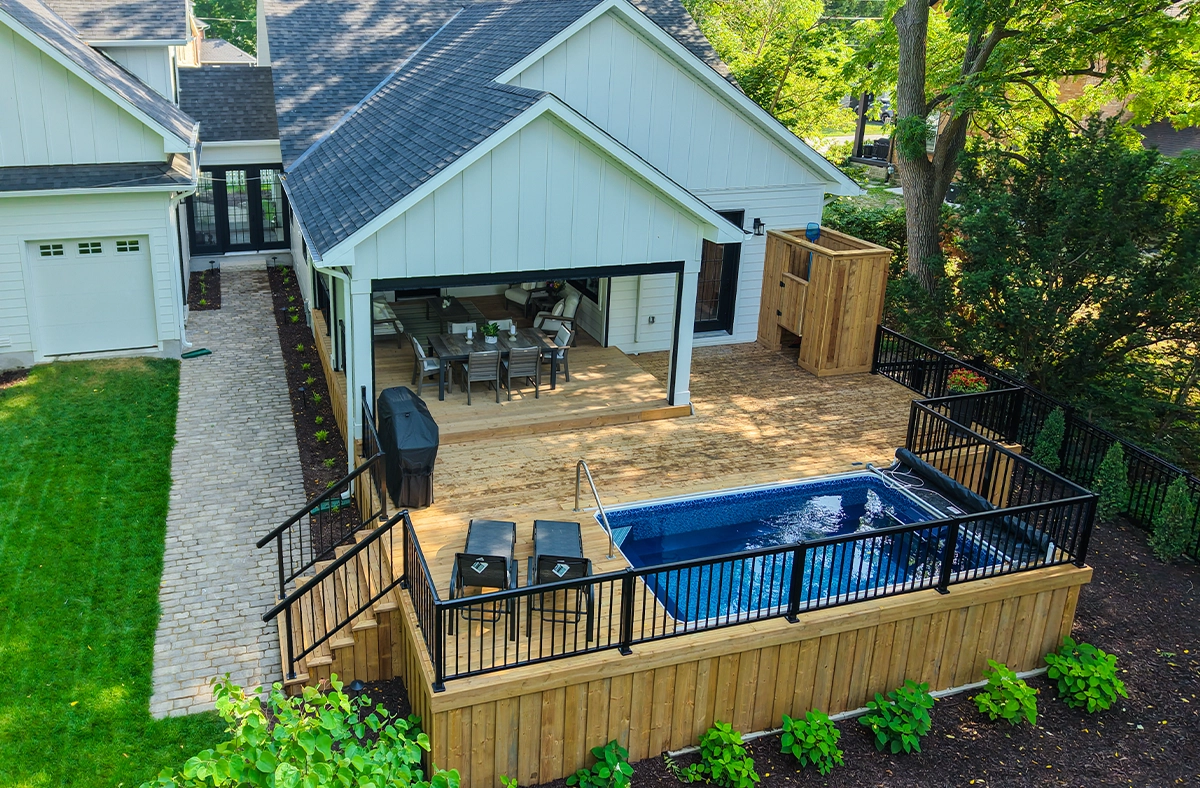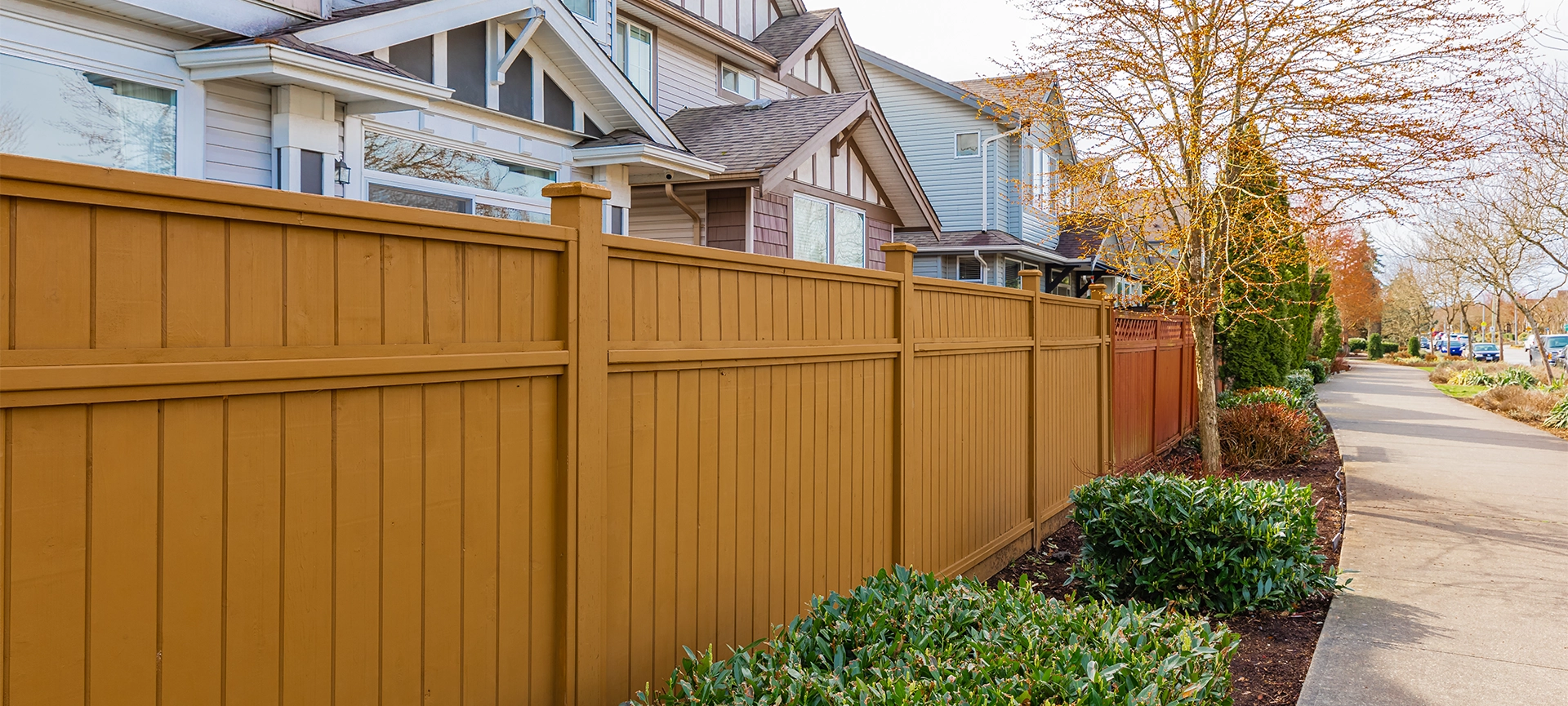
Vinyl vs. Wood vs. Chain-Link: Which Fencing Materials Offer the Best Value in Toronto?
A fence does more than mark a boundary. It adds privacy, defines curb appeal, and raises property value when it is built with the right fencing materials. Toronto homeowners often compare vinyl, wood, and chain-link because each delivers a different balance of cost, strength, and long-term upkeep.
This guide explains how each option performs in Toronto’s climate so you can pick the fence that delivers the best value for your property and long-term plans.
Related Article: Toronto Fence Pricing in 2025: Cost Per Linear Foot Breakdown
Vinyl Fencing
Vinyl remains a popular choice for homeowners who want a clean look without heavy maintenance. The panels resist moisture, insects, and rot, which makes vinyl reliable through Toronto’s freeze–thaw cycles.
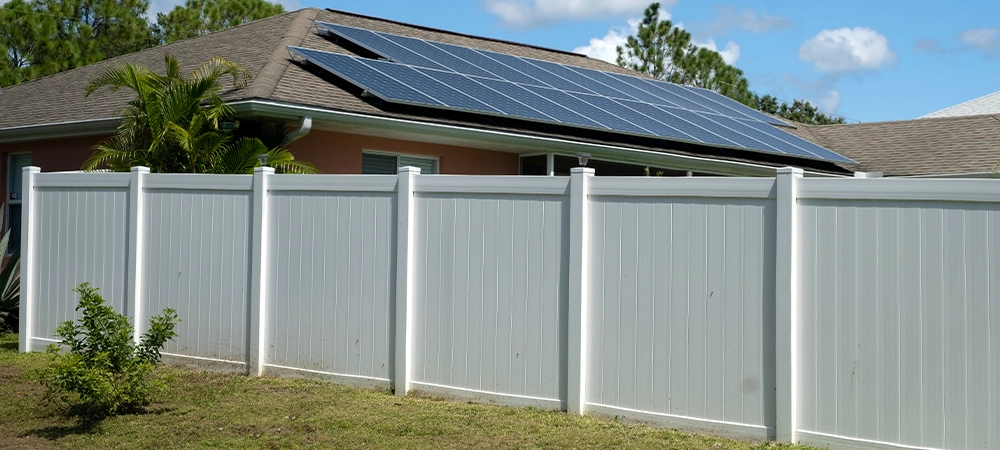
Key Advantages
- Low maintenance; no painting or sealing
- Strong resistance to moisture damage
- Colour does not fade quickly
- Smooth finish with modern designs
Potential Drawbacks
- Higher upfront cost than wood
- Repairs require panel replacement rather than small fixes
- Limited flexibility for custom features
Best For
Homeowners who want a long-lasting fence with minimal upkeep and consistent appearance year-round.
Wood Fencing
Wood is the most versatile option and offers a warm, natural look that suits many Toronto neighbourhoods. Green Side Up Contracting installs high-quality wood and privacy fences that match a wide range of yard styles.
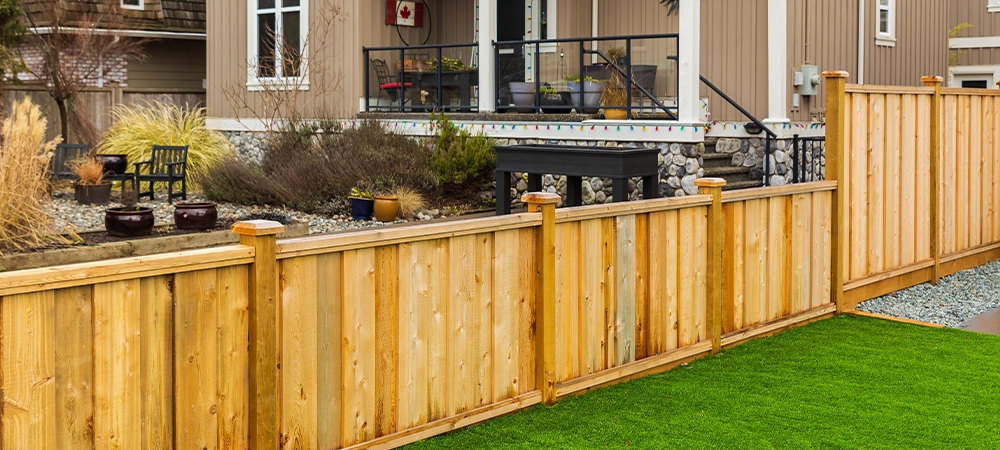
Key Advantages:
- Highly customizable
- Ideal for privacy and full-height coverage
- Suitable for staining or painting
- Repairs are simple and budget-friendly
Potential Drawbacks:
- Needs routine sealing or staining to extend lifespan
- Prone to rot or warping if not maintained
- Ageing is visible sooner than vinyl
Best For:
Homeowners who value a natural aesthetic, want custom options, or need full privacy around backyards or pool areas.
Chain-Link Fencing
Chain-link is the most cost-efficient choice and remains common for practical enclosures. It is used across residential and commercial properties where visibility and security matter more than decorative appeal.
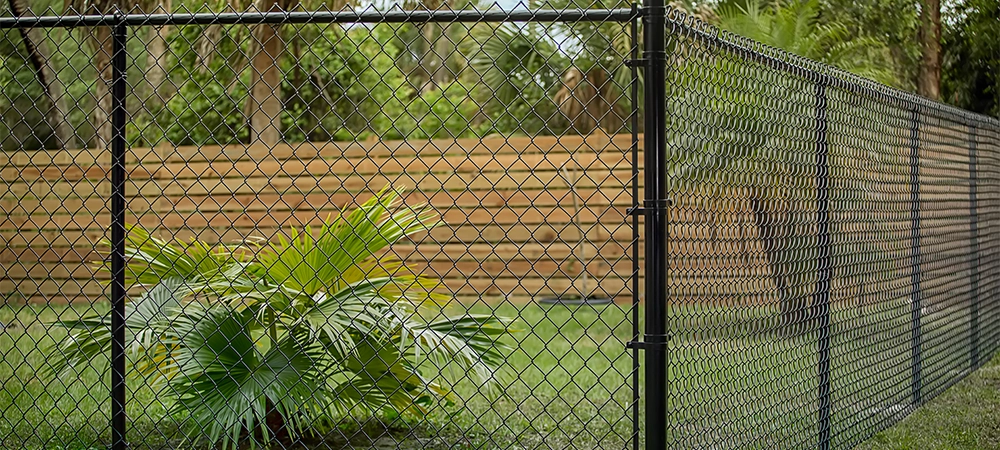
Key Advantages:
- Lowest upfront cost
- Fast installation
- Reliable for pets, gardens, and perimeter control
- Long lifespan with minimal maintenance
Potential Drawbacks:
- Limited privacy
- Basic appearance
- Less curb-appeal value compared with vinyl or wood
Best For:
Large yards, garden enclosures, rental properties, and areas where affordability and function come first.
Related Article: How Much Does an Aluminum Fence Cost
Cost Comparison in Toronto
Each fencing material lands in a different price tier, but the value you receive isn’t based on cost alone. In Toronto, prices shift depending on fence height, yard layout, gate placement, and installation complexity. Comparing upfront and long-term costs helps you see which option delivers the strongest return.
Cost Table: Vinyl vs. Wood vs. Chain-Link in Toronto
| Material | Typical Upfront Cost (GTA Estimate) | Long-Term Maintenance Costs |
| Vinyl | $45–$95 per linear foot (installed) | Very low; occasional washing |
| Wood | $45–$70 per linear foot (installed) | Moderate; sealing or staining every few years |
| Chain-Link | $40–$65 per linear foot (installed) | Low; occasional rust checks |
*Costs reflect common residential installations in the Greater Toronto Area. Actual pricing varies with height, gate placement, terrain, and removal of old fencing.
What These Costs Mean for Long-Term Value
A fence’s price makes sense only when you look at how the material performs over time. These points show how each option holds its value once weather, upkeep, and lifespan are factored in.
Vinyl: Higher Upfront, Lower Long-Term Costs
Vinyl costs more at installation, yet the savings add up because there is no staining, sealing, or repainting involved. It resists moisture, keeps its shape through Toronto’s freeze–thaw cycles, and maintains its colour well. The predictable upkeep makes vinyl appealing for families who want long-term stability without yearly tasks.
Wood: Competitive Cost with Custom Appeal
Wood lands in the mid-range for installation and remains popular because of its natural appearance. Many homeowners prefer its versatility for backyard upgrades. The main consideration is maintenance.
Staining or sealing is essential to protect boards from moisture and sun exposure, and this recurring cost influences their long-term value.
Chain-Link: Most Affordable and Highly Functional
Chain-link offers the lowest initial cost and delivers strong reliability for security, pets, and full-yard coverage. It stands up well to weather and requires little attention. Although it is the least decorative option, it provides solid value for homeowners who prioritize budget and function.
Related Article: How Long Does an Aluminum Fence Last
Durability and Climate Performance
Toronto’s weather puts every fence to the test. Humidity, sudden temperature drops, strong UV levels, and the freeze–thaw cycle create pressure that affects fencing materials differently. A material that performs well in mild regions may struggle here, so climate behaviour should be a key part of your decision.
Vinyl: Highly stable year-round
Vinyl handles Toronto’s seasonal shifts with ease. It does not absorb moisture, so it avoids swelling or shrinking during temperature swings. Its surface remains smooth, and colour changes happen gradually rather than dramatically.
For homeowners who want a set-and-forget fence, vinyl is dependable.
Wood: Strong but sensitive without proper care
Wood is sturdy, but moisture affects it more than other materials. Without sealing, boards can warp or soften over time. Snow buildup and repeated freeze–thaw cycles highlight the need for seasonal maintenance.
When maintained correctly, wood remains reliable and visually appealing for years.
Chain-Link: Strong structural performance
Chain-link holds up well against winter storms and heavy rain. The metal framework remains stable, and rust-resistant coatings help extend lifespan. Aesthetic wear shows sooner than physical wear, but the fence remains strong even when the finish begins to age.
If long-term durability is your key concern, vinyl and chain-link lead the list. If visual warmth and custom design matter more, wood remains unmatched with the right care.
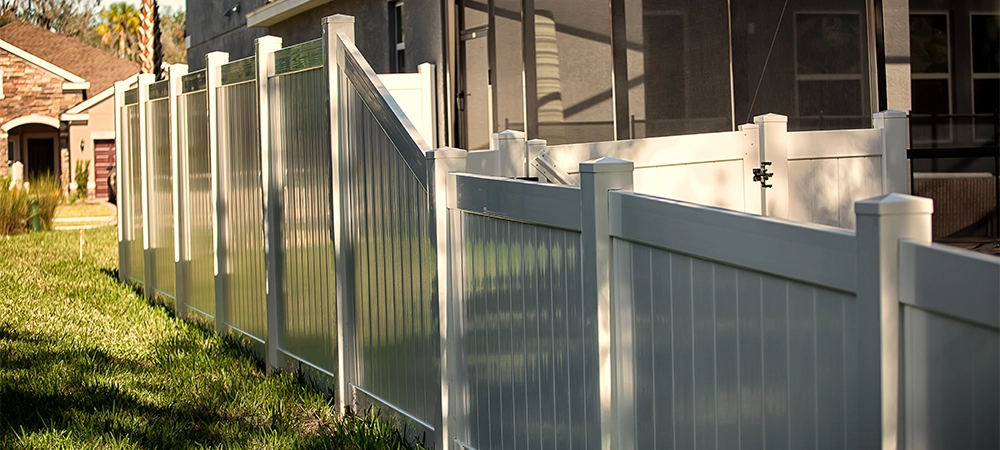
Which Fence Offers the Best Overall Value?
Value varies based on what you want from your fence. A fence that feels “best” for one homeowner may not suit another, so the key is matching your priorities with the strengths of each material.
- Best long-term savings: Vinyl
Vinyl’s durability and low upkeep create steady savings over the years, especially for homeowners who plan to stay in their property long-term.
- Best privacy and style: Wood
Wood provides full-height privacy and blends well with landscaping projects. If aesthetics shape your decision, wood usually wins.
- Best upfront affordability: Chain-link
Chain-link remains the most cost-effective material for security, pets, garden areas, and rental properties. It delivers strong performance without stretching the budget.
- Best overall balance: Wood or vinyl
Most Toronto families narrow their decision to these two. Vinyl offers convenience and longevity, while wood offers warmth and design flexibility.
The strongest choice depends on your budget, maintenance comfort, privacy needs, and the long-term look you want for your outdoor space.
For homeowners comparing materials, exploring our full fencing materials options can help you choose the design, height, and layout that suit your property best.
Recommended Next Step
Choosing between vinyl, wood, and chain-link becomes much easier when you compare cost, upkeep, and how each material performs through Toronto’s climate.
Vinyl offers steady long-term savings, wood brings warmth and full privacy, and chain-link delivers reliable function at the lowest entry price. The right choice depends on how you want your yard to look, how much maintenance you prefer, and what level of privacy or durability fits your plans.
If you want expert guidance or need a clear estimate for your property, Green Side Up Contracting can walk you through every option and explain what works best for your yard layout.
Book your fencing estimate today and start planning a fence that adds value to your home.
Frequently Asked Questions
How long does each type of fence last in Toronto?
Vinyl can last 25 years or more. Wood typically lasts 10 to 15 years with proper care. Chain-link often exceeds 20 years, especially when galvanized.
Which fencing option offers the most privacy?
Wood delivers the strongest privacy, especially in full-height designs. Vinyl privacy panels also offer solid coverage.
Can I add gates or custom features to any fence?
Wood is the easiest to customize. Vinyl and chain-link allow gates and accents, but design flexibility is more limited.
Are there fencing height rules in Toronto?
Yes. Most residential fences must follow local bylaws for height and placement. A professional fence installer can confirm the correct height for your property line.
Does a new fence increase home value?
Yes. A well-built fence improves curb appeal, defines usable space, and adds security, all of which help raise property value.


